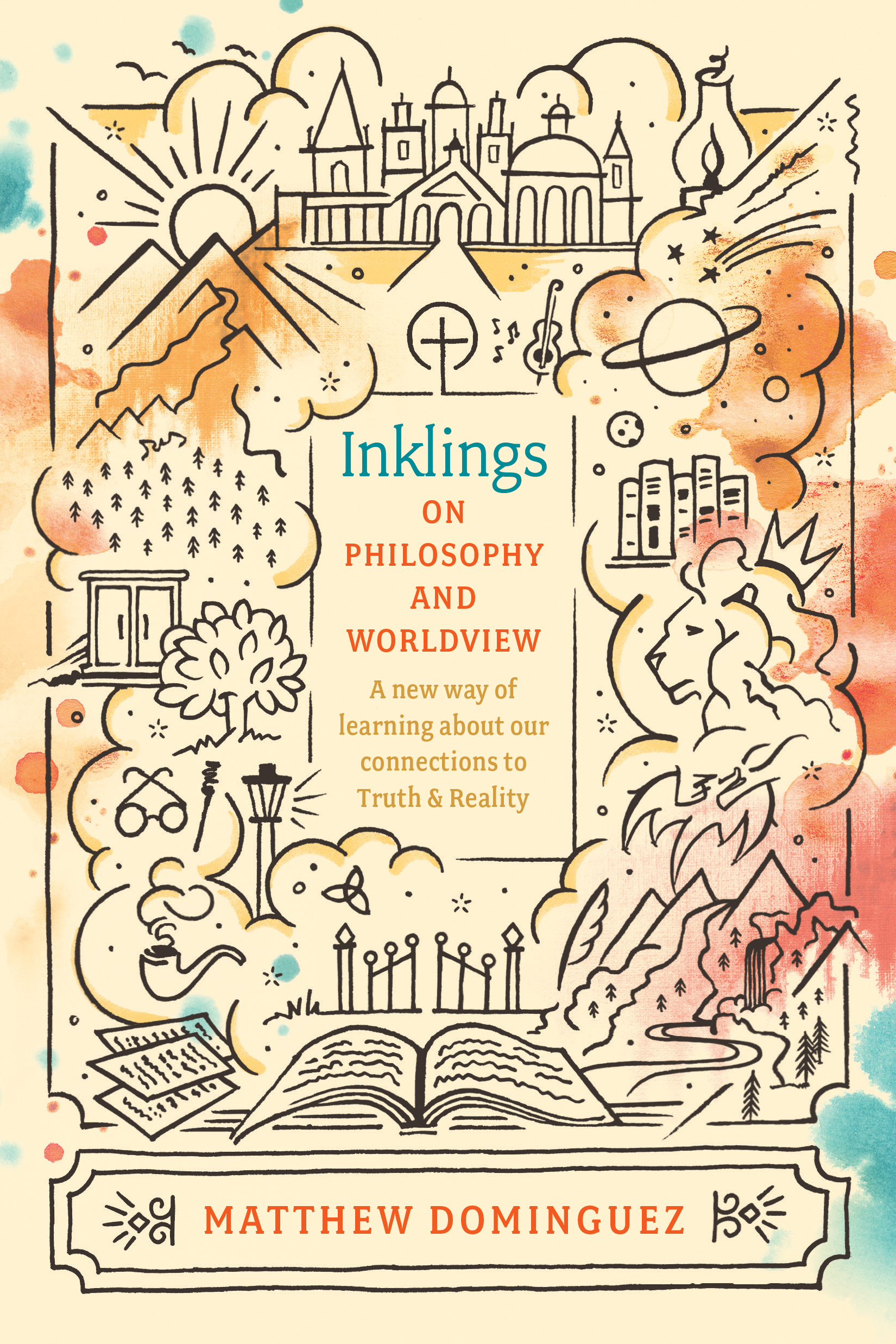Practical philosophy is an important tool with vast amounts of power.
Adapted from Inklings on Philosophy and Worldview by Matthew Dominguez
Author Philip Yancey, who wrote the foreword to an edition of Chesterton’s Orthodoxy, dubbed him the “prophet of mirth”1 due to his ability to artfully engage others in sincere dialogue through wit, whimsy, and laughter. Because Chesterton knew and practiced all this, he was able to experience great gratitude for his life. This is revealed in his poem “Evening”:
Here dies another day
During which I have had eyes, ears, hands
And the great world round me;
And with tomorrow begins another.
Why am I allowed two? 2
Chesterton had a sense of joy-filled privilege for his day-to-day life, and he believed life is beautiful and purposeful. This is what I want for you, but I understand you may not feel the same as Chesterton. It’s not always easy to see life as a privilege because it is often difficult to make sense of the world and the daily decisions we have to make. So how do we do this? How do we discover gratitude for life? How do we make sense of it?
We use the tool of practical philosophy. Practical—or applied—philosophy helps us see that we already have a framework in place that guides our decisions and helps us “make sense” of the world. Practical philosophy helps us honestly examine and understand this framework—our views—and better understand the views of others. Therefore, it allows us to engage in respectful dialogue and relationship with others, even those with very different views.
Practical philosophy is an important tool with vast amounts of power, so as with all powerful tools, some instruction and caution is needed before we actually begin using it.
I inherited my grandfather’s leather-handled antique hammer. It’s clearly worn and broken in from frequent use. A hammer is meant to be used. It is not an object to be put on display in pristine condition or simply talked about or waved in the air. My Grandpa Sam, who loved to build, used his hammer. Philosophy is a tool like a hammer. If we are not using it to build and construct our trust lists and worldviews, it is as if we have bought a hammer simply to carry it around or display it. It will look, feel, and be ostentatious.

So philosophy, like a hammer, is meant for use. Here’s another similarity. Though a hammer is a powerful, focused tool, almost anybody can learn to use one. My seven-year-old twins love pounding nails and building birdhouses or fairy gardens with hammers. Elijah, Anna’s twin brother, is like my grandfather; he loves to use tools with purpose. Grandpa Sam was a master craftsman; Elijah is what we might call on his way to becoming a master. Another similarity is that a hammer can be useful for demolition and deconstruction as well as for building (see chapter 4). If I need to renew my mind and change my perspective, I can use philosophy as a hammer to carefully pull apart the nails and boards of what I previously trusted, in order to create space for an addition or a new kitchen—a shift in perspective. I could also use philosophy like a sledgehammer and swing it around for an extreme makeover, creating space for a whole new house—a new way to see the world and thus a new way to live in the world. Whether the tool of philosophy is used for big or small projects, it requires skill, and with skill the tool of philosophy can be creative or destructive.
Because philosophy is a tool, it has neutral moral value. Consider common items like a cell phone or a car. In and of themselves they are morally neutral—neither good nor evil. Therefore, as tools, their value, usefulness, and moral implications are determined by the intent and motivation of their users. A hammer can be used to build, renovate, or repair, but it can also be used to smash windows or even skulls. The tool of philosophy has sometimes been used in just this cruel way. Thus, we must be hypervigilant to use it in safe, honoring, loving, and generative ways. Furthermore, due to the powerful nature of the tool of philosophy, a lack of experience, awareness, character, or skill creates an implied danger—like the difference between giving my young son a traditional hammer and nail gun.
I find it intriguing and overwhelming to watch the latest Star Wars or superhero movies with worldview and philosophy in mind. I know that philosophy and worldview are powerful tools. And when I watch these movies, I notice that both the heroes and the villains are powerful individuals endowed with superpowers that make them each unique. What is most striking is that the core difference is found in their character—the heroes are loving, generous, and kind. The best villains are noticeably complex and relatable yet ultimately selfish, cruel, and destructive. The superpowers could almost always be considered neutral tools; it is how each individual character uses their powers that makes them a hero or a villain. If this book empowers you—in the literal sense of the word, “to give more power to”—with the superpowers of philosophy and answers to the big questions of life yet does not help or inspire you to become more kind, honoring, and loving in the process, it could be helping to create more villains instead of heroes. This is the risk of education, a huge but necessary risk.

When we are not careful in how we use philosophy, not only does it damage those around us; it damages us. When we use philosophy with pretense, we become foolish. When we use it with ill intent, we become cruel. There has been and is too much abuse and cruelty caused by misuse of philosophy. When abused and misused, it becomes toxic and destructive; it spreads fear and confusion; it poisons everything.
But the opposite is also true: when philosophy is used well, it is a powerful instrument for good. It leads to good thought and to good action. Margaret Mead is thought to have said, “Never doubt that a small group of thoughtful, committed citizens can change the world. Indeed, it is the only thing that ever has.” We frequently see the slogan “Be the change you want to see in the world.” And Anne Frank declared, “How wonderful it is that no one has to wait, but can start right now to gradually change the world!”3 Improving your own perspective of the world is a great way to start improving the world itself.
- G. K. Chesterton, Orthodoxy (Colorado Springs: Shaw Books, 2001), vii.
- Chesterton, xii.
- Anne Frank, Anne Frank’s Tales from the Secret Annex: A Collection of Her Short Stories, Fables, and Lesser-Known Writings, ed. Gerrold van der Stroom and Susan Massotty (New York: Bantam, 2003), 121.
 Inklings on Philosophy and Worldview: by Matthew Dominguez
Inklings on Philosophy and Worldview: by Matthew Dominguez
Teens live in a complicated world. They are constantly bombarded by messages from their friends, parents, teachers, the internet, and their churches, and not all of these messages agree or line up with each other. How do students figure out who to listen to? How do they figure out what is true?
Inklings on Philosophy and Worldview will show teens practical ways to filter out the wrong messages and focus on what is real. Using teachings from highly respected, loved, and well-known writers, teacher Matthew Dominguez will show teens the power of story as he guides them through a study of world religions, philosophies, and worldview, and gives them a firm foundation to stand on as they prepare to face the world.
Learn more about Inklings on Philosophy and Worldview HERE




